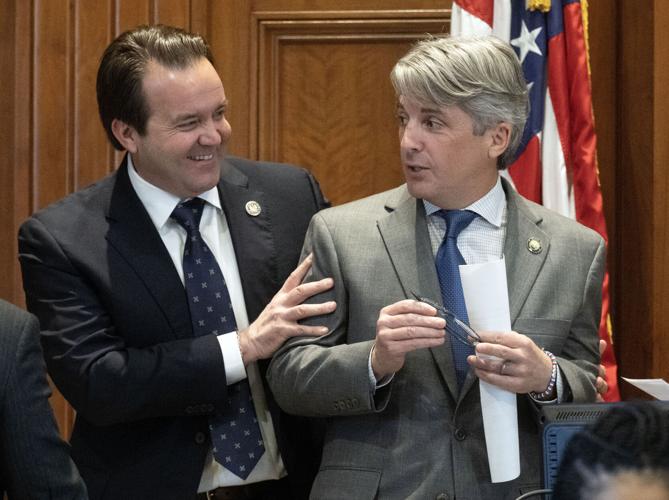Louisiana higher education institutions recruit hard and heavy, showing potential students their best attributes, sharing positive details and facts, and showing off some of their beautiful, famous, historic buildings and landscapes.
There are other tours, the kind that don't show up on college brochures and websites. These are the tours that facilities and maintenance staff show their university leaders, hoping that something on the tour causes enough frowns — and maybe guffaws — to bring about action. Money. Repairs.
There are photographs and video evidence of how bad things have gotten. There are calls, emails and annual summaries prioritizing infrastructure needs, including what might happen if the issues aren't addressed.
If the prodding works, university leaders prioritize old and new projects and seek funding from their respective higher education systems — and the Louisiana Legislature.
But there's a wrinkle.

Louisiana Commissioner of Higher Education Kim Hunter Reed, Ph.D., looks for her seat on opening day of the regular legislative session, Monday, March 11, 2024, at the Louisiana State Capitol in Baton Rouge, La.
For years, even well-documented, well-justified infrastructure needs have had to compete with flashy, high-profile projects — especially those with "state-of-the-art" features — sometimes generating more excitement, more interest, more money and more green lights.
Bottom line: Few of the many facilities and deferred maintenance needs can be addressed each year. There's never enough money. Ongoing needs have to compete with new projects. University leaders have been asked to choose between crumbling infrastructure and sexier projects that are easier to sell.
A bill now under consideration by state lawmakers would change that.
House Bill 940 would establish a new pathway for public higher education institutions to deal with significant infrastructure problems, some of which have been on priority lists for years, even decades. House members overwhelmingly approved it, 98-4. The measure is getting a thorough review in the Senate Finance Committee, which must approve it before it goes to the full Senate.
If enacted into law, the bill would provide more than $1.6 billion to fix many things that desperately need to be fixed. Louisiana's deferred maintenance backlog is nearly $2 billion. Some things wouldn't get touched.

Grambling State University's Hobdy Center, an academic, classroom and gymnasium complex, has a roof that needs a $650,000 repair.
The LSU System would get $752 million. The University of Louisiana System would get $523 million. The Louisiana Community & Technical College System would receive $253 million. The Southern University System would get $153 million.
The LSU Library in Baton Rouge is one of the most high-profile campus buildings in need of repairs. Its roof is an embarrassment. Leaks constantly put books at risk. Wet floors put students at risk.
LSU is planning a new library, so any repairs might be a patchwork job. The LSU library's roof is just one example Reed cited. There are many pressing needs.
Southern University's Baton Rouge campus needs $28 million for a chilled line replacement to keep faculty and students cool during long months of hot weather. Louisiana Tech University's well-used Wyly Tower needs repairs to keep people cool, at a cost of $2.9 million. Nicholls State's Peltier Hall needs cooling assistance to the tune of $3.9 million.
"A lot of times when a student leaves the state, they don't come back," DeVillier added. "We can create a better environment by disrupting the learning environment and making things better. Some other states don't have these problems." He said he'd like to add another $400 million to get everything done.
Reed told me Thursday that she's "very excited about the legislation" and the possibilities it presents. Still, she cautioned, even though "we're almost there," the legislative process continues.

Southern University in Baton Rouge needs $9 million for a number of campus roof repairs.
"There hasn't been a comprehensive approach" to deal with deferred maintenance, Reed said. "We can accelerate (students') ability to learn and flourish."
Louisiana doesn't have to lag with outdated equipment, hot classrooms and subpar labs. We don't have to lose students to better campuses. We can attract quality students, faculty and staff.
Catching up on deferred maintenance would be a big step forward.
























